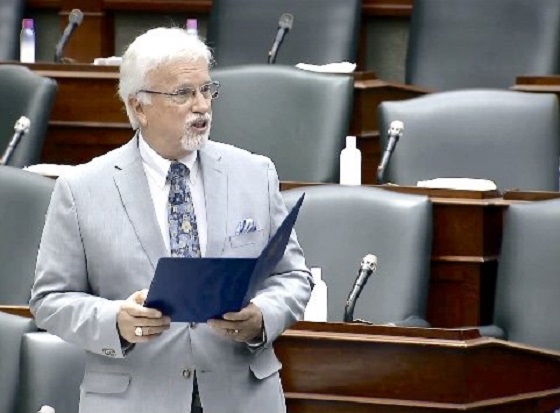Crime
RCMP seize house and $14,000 in civil forfeiture application – Update #2

RCMP seize house and ,000 in civil forfeiture application – Update #2
Red Deer, Alberta – Red Deer RCMP’s 2016 application to seize a house worth $300,000 and about $14,000 cash as proceeds of crime came to its conclusion on Friday when the courts granted the forfeiture. The application stemmed from a 2015 Priority Crimes Task Force search warrant that netted 10,000 prescription pills and saw a Red Deer man charged with drug trafficking and then later further charged with money laundering.
On Friday, April 27 in Red Deer, the court heard the application and granted it. All proceeds from the sale of the house will go to the Civil Asset Forfeiture fund with the exception of $7,500 that will be reimbursed to a subsequent owner for renovations that were done on the residence. The remainder is channeled to victims of crime through the Civil Asset Forfeiture fund.
Allie Gader is currently in custody regarding the 2015 trafficking charges; the money laundering charges are still before the courts.
“We’re glad to bring this long and detailed investigation to a successful conclusion,” says Constable William Lewadniak, Red Deer RCMP financial crimes investigator. “Red Deer RCMP’s goal in using the Civil Asset Forfeiture Program is to take the profit out of crime, cripple the financial core of organized crime, and make it more difficult for criminals to continue to break the law.”
In Alberta, proceeds seized under the Civil Asset Forfeiture Program are prevented from being sold until the courts make a final ruling about whether it should be returned or disposed of. If the court finds that the property was obtained by crime or used to commit crime, then the court can direct the proceeds to compensate victims, reimburse expenses and/or be forfeited to the Civil Forfeiture Fund.
For more information about the Civil Forfeiture Act and the Victims Restitution Act please see https://justice.alberta.ca/programs_services/safe/Pages/civil_forfeiture.aspx.
FINTRAC (Financial Transactions and Reports Analysis Centre of Canada) is Canada’s financial intelligence unit. Its mandate is to facilitate the detection, prevention and deterrence of money laundering and the financing of terrorist activities, while ensuring the protection of personal information under its control.
Addictions
British Columbia to re-criminalize hard drug use in public after massive policy failure

From LifeSiteNews
British Columbia premier David Eby announced that his province plans to re-criminalize hard drug use in public spaces after its decriminalization last year led to widespread social disorder.
British Columbia is asking the Trudeau government to roll back its drug decriminalization program after increased violence and continued overdoses.
On April 26, New Democratic Party (NDP) premier of British Columbia David Eby announced that he is working with Prime Minster Justin Trudeau’s federal government to re-criminalize drug use in public spaces, including inside hospitals, on transit, and in parks. British Columbia, under permission from the Trudeau government, had decriminalized such behavior in 2023.
“Keeping people safe is our highest priority,” Eby explained in a press release. “While we are caring and compassionate for those struggling with addiction, we do not accept street disorder that makes communities feel unsafe.”
“We’re taking action to make sure police have the tools they need to ensure safe and comfortable communities for everyone as we expand treatment options so people can stay alive and get better,” he continued.
Under the new regulations, police would be given the power to prevent drug use in all public places, including hospitals, restaurants, transit, parks and beaches.
However, drug use would remain legal at “a private residence or place where someone is legally sheltering, or at overdose prevention sites and drug checking locations.”
Eby’s concerns over drug use were echoed by Minister of Public Safety and Solicitor General Mike Farnworth who said, “Our communities are facing big challenges. People are dying from deadly street drugs, and we see the issues with public use and disorder on our streets.”
“As we continue to go after the gangs and organized criminals who are making and trafficking toxic drugs, we’re taking action now to make it illegal to use drugs in public spaces, and to expand access to treatment to help people who need it most,” he promised.
Beginning in early 2023, Trudeau’s federal policy, in effect, decriminalized hard drugs on a trial-run basis in British Columbia.
Under the policy, the federal government began allowing people within the province to possess up to 2.5 grams of hard drugs without criminal penalty, but selling drugs remained a crime.
While British Columbia has not yet indicated it plans to re-criminalize possession, its decision to clamp down on public drug use presents a major departure from its previous tactics of continually liberalizing its attitude toward narcotic use.
Since being implemented, the province’s drug policy has been widely criticized, especially after it was found that the province broke three different drug-related overdose records in the first month the new law was in effect.
The effects of decriminalizing hard drugs in various parts of Canada has been exposed in Aaron Gunn’s recent documentary, Canada is Dying, and in U.K. Telegraph journalist Steven Edginton’s mini-documentary, Canada’s Woke Nightmare: A Warning to the West.
Gunn says he documents the “general societal chaos and explosion of drug use in every major Canadian city.”
“Overdose deaths are up 1,000 percent in the last 10 years,” he said in his film, adding that “[e]very day in Vancouver four people are randomly attacked.”
Alberta
Three Calgary massage parlours linked to human trafficking investigation

News release from the Alberta Law Enforcement Response Team (ALERT)
ALERT’s Human Trafficking unit has searched and closed three Calgary massage parlours. A year-long investigation has linked the businesses and its owner to suspected human trafficking.
ALERT arrested Hai (Anna) Yan Ye on April 16, 2024 and charged the 48-year-old with advertising sexual services, drug offences and firearms offences. The investigation remains ongoing and further charges are being contemplated.
Ye was linked to three commercial properties and two homes that were allegedly being used for illegal sexual activities and services. The massage parlours were closed following search warrant executions carried out by ALERT, the Calgary Police Service, and the RCMP:
- Seagull Massage at 1034 8 Avenue SW;
- 128 Massage at 1935 37 Street SW; and
- The One Massage Centre at 1919 31 Street SE.
- 1100-block of Hidden Valley Drive; and
- 3100-block of 12 Avenue SW.
As result of the search warrants, ALERT also seized:
- $15,000 in suspected proceeds of crime;
- Shotgun with ammunition; and
- Various amounts of drugs.
“We believe that these were immigrants being exploited into the sex trade. This has been a common trend that takes advantage of their unfamiliarity and vulnerability,” said Staff Sergeant Gord MacDonald, ALERT Human Trafficking.
Four suspected victims were identified and provided resources by ALERT’s Safety Network Coordinators.
ALERT’s investigation dates back to February 2023 when a tip was received about suspicious activity taking place at the since-closed Moonlight Massage. That location was closed during the investigation, in December 2023, when the landlord identified illegal suites on the premises.
The investigation involved the close cooperation with City of Calgary Emergency Management and Community Safety, Alberta’s Safer Communities and Neighbourhoods (SCAN) team, Canada Border Services Agency (CBSA), and the RCMP.
Ye was released from custody on a number of court-imposed conditions.
Anyone with information about this investigation, or any case involving suspected human trafficking offences, is asked to call Crime Stoppers at 1-800-222-TIPS (8477) or the Calgary Police Service non-emergency line at 403-266-1234.
ALERT was established and is funded by the Alberta Government and is a compilation of the province’s most sophisticated law enforcement resources committed to tackling serious and organized crime.
-

 Education13 hours ago
Education13 hours agoSupport a young reader through the Tim Hortons Smile Cookie campaign
-

 Alberta1 day ago
Alberta1 day agoAlberta’s vision for passenger rail
-

 RCMP1 day ago
RCMP1 day agoRed Deer RCMP arrest two individuals following ramming of police vehicle
-

 COVID-192 days ago
COVID-192 days agoFormer Canadian lawmaker has no regrets about refusing COVID shot despite losing his job
-

 COVID-192 days ago
COVID-192 days agoPeckford: Hallelujah! Supreme Court of Canada to hear Newfoundland and Labrador charter case
-

 John Stossel1 day ago
John Stossel1 day agoWhy Biden’s Just Wrong: NO ONE “Knows How to Make Government Work.”
-

 Education1 day ago
Education1 day agoRebels earn Jim Donlevy Memorial Trophy as WHL Scholastic Team of the Year
-

 Alberta1 day ago
Alberta1 day agoThree Calgary massage parlours linked to human trafficking investigation






